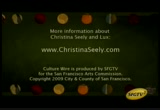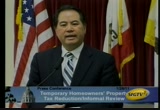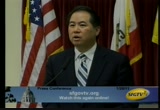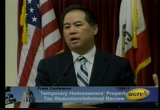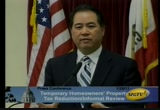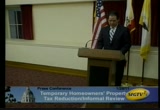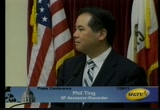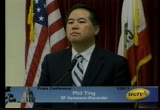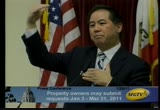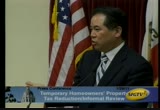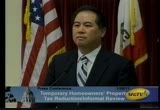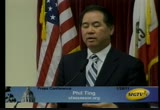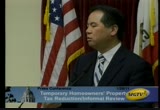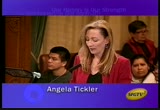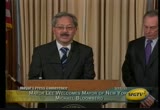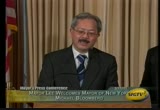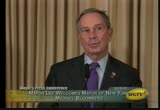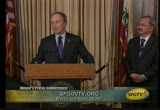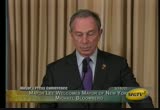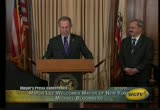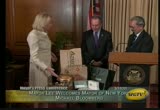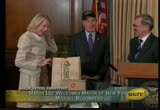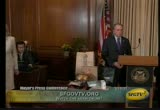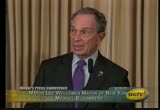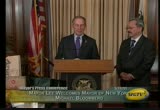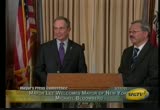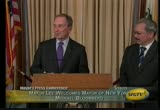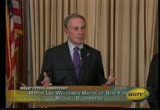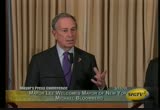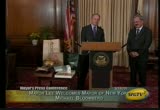tv [untitled] March 22, 2011 11:00am-11:30am PDT
11:01 am
>> thanks for coming today. we are announcing are temporary homeowner's property tax reduction program. this is what most assessor's up and down the state are doing. homeowners are reliable -- of all property owners are eligible for a temporary, 1-year property-tax assessment reduction if they believe or if we believe dave -- the assess the value has fallen above their market value, which means that the value would be lower than the market value. in general, homeowners who are eligible, chances are, they purchased homes after 2003. we do get applicants who have owned homes since 1995 or earlier. in general, anybody who is owned their home prior to 2003, they are doing well, which is good
11:02 am
news. chances are the market value is higher than the assessed value, meaning the property appreciate it. people we are able to offer little relief for, the sad news is, their homes have depreciated. there will be a little bit of relief for them. in general, last year, we saw 6400 applicants in comparison to four years ago when we had 248 requests. the form a simple. it is one page. name, telephone number, e-mail, and the address you are applying for. if you can give us sales in formation of similar types of homes, we do hope you can give us that. if you cannot come maternity leave blank and sign it. e-mail or fax it to us -- if you cannot give us that, leave
11:03 am
it blank and sign it. e-mail or fax it was. tenderloin downtown, south of market, mission bay, and south beach. those were many of the new high- rise condominiums that went in to market the last four or five years. we have seen a significant amount of depreciation in those areas. gaviria that has seen the largest value drop is -- the other area that has seen the largest volume drop is the outer mission, amazon, those areas have seen the largest percentage drop. it is where we have been hit hardest with foreclosures. we make sure that we take an extra look. we proactively have been reviewing every home that was purchased after 2000. even though we think eligibility is for people up to 2003, we review any homeowner who purchased after 2000. that was roughly about 15,000
11:04 am
homeowners. of that, reduced -- no one had to apply or call us. we did this on our own. we reduced 10,000 of those homeowners. roughly, you have 10,000 reductions that we did on our own. 1700 reductions were done through this application process. 5000 time shares is how you get to the 17,000 number. just to give you a comparison, it is quite a bit in san francisco. these are huge numbers, larger than the dot com bust. alameda and santa clara did about 1000 come a tenfold. -- 1000, tenfold. we are doing better than our counterparts in other parts of the bay area. i feel fortunate. the tax reduction was about 21
11:05 am
million in taxes that were not collected. 21 million in taxes were not collected. that is a significant number. it is out of a $6.5 billion budget. overall, the difference to the city is still rather small compared to what it meant to many of the other counties in other areas. let me stop there and take questions. >> [inaudible] >> 6462. of those, we actually reviewed only 4177. many of those were already reviewed. we have actively reviewed them. some of them were not eligible. >> [inaudible] >> anybody who has gotten a reduction, they don't need to
11:06 am
apply. we will look at it again. if you have gotten a reduction through an appeal or through our office, they don't need to apply again. they will be reviewed. they may want to apply because maybe they want to give us information we don't know. they are free to do that. that will be reviewed as part of that process. in general, they don't need to submit paperwork if they already got a reduction last year. >> [inaudible] >> well, i think because it is just flat, the market has not rebounded and gone up. we will probably see the same number of people deserve reductions last year. i think it will be comparable. traditionally, an economic
11:07 am
recovery is like a v. this is more like a u. we're at the bottom of it right now. my feeling is we are going to see, you know, a very unusual real-estate market in san francisco. it will be flat and not appreciate a whole lot right now. the number people who are eligible is probably similar to last year. i bet we will give about the same number of reductions this year as we did last year. it will not be that much different. >> [inaudible] >> anybody that was reviewed -- everybody in san francisco got a letter from us in july. they were told what their assessed value was. there were told that they got a reduction. if they got a reduction based on the letter, they don't need to reapply. what people do is we will review applicants. the deadline is march 31. all 17,000 who got reductions will be reviewed automatically. everyone will get notified again
11:08 am
in july. we will not talk to anybody prior to that. everyone else will be getting the standard notification in july. >> [inaudible] you review these every year. >> every year. the reductions we review every year. as the market appreciates, we may take their assessments up based on what the market value is. they may go all the way back up to the factor value. it may go up partially higher. obviously, that is what he would see. you would see a step over the years to include the appreciation based on what the market is feeling. right now, we are not seeing a whole lot of appreciation. chances are, the assessment will be a little bit different than last year. the original purchase applies plus whatever the inflation factor was on an annual basis.
11:09 am
in general, up to 2%. we had a negative inflation factor for the first time last year. everybody got a reduction last year. >> [inaudible] >> this year, cpi based on the final number we saw, is. 5% positive. it is still well below 2%. -- is .5% positive. it is still well below 2%. the economy is still rather flat. >> [inaudible] >> everybody who does not get a reduction will get a .5% increase in their assessment. that is just a proximate. it will probably be pretty close to that.
11:10 am
we can show you the website. we follow the same website. it is the state cpi. it is a tracking mechanism for the state. >> [inaudible] >> i think there will vote to finalize in the next month or two. i think the number is done. >> overall, when all is said and done, what is the amount that you're going to receive [inaudible] >> for reductions, it will really just depend on how much your property might have depreciated or appreciate id. some areas where maybe there was a 5% or 3%, the good news in san francisco, we have not seen a few drops we saw in other parts of the bay area, like solano, or
11:11 am
properties dropped 50%. you don't want that. you want your property to appreciate. that is the goal. it might be $50, $100, maybe a few hundred dollars. it and will not be anything huge -- it will not be anything huge. >> [inaudible] >> over last year, it was a $21 million difference. because of the temporary reductions in homeowners values, there was $21 million that was not collected by the county. let's put that in context of the $6.5 billion budget. >> [inaudible] >> the total property tax collected is about $2 billion. overall, we are doing quite well. >> [inaudible] >> overall, property-tax as have done extremely well the last five, 10 years. we have seen huge increases overall. >> [inaudible]
11:12 am
>> no idea. if i did, i should be in las vegas placing a bet, or should be in new york making more money than i am here. the controller's office is probably tracking it more than us. we don't know. we have seen -- we have seen several governments pumped $1 trillion into the economy. it is a huge amount of money. we have seen some improvements, but not the ones they were hoping for. great. ok. thanks, everybody.
11:14 am
>> good afternoon, everyone. i have had the very fortunate opportunity to meet mayor bloomberg from new york, of course, and, of course, reminded them that both of my daughters, he needs to take care of them because they are studying graduate school in new york, and to welcome him here to san francisco. obviously, we have a lot in common because we are both makers of big cities with very complicated populations and a lot of things happening, but wanted to take the opportunity to welcome mayor bloomberg here to san francisco. immediately, we talked about a passion we both have, and that is golf, so i wanted to present him with a ++in exchange, he mie
11:15 am
something for me relative to golf, but, mayor bloomberg, welcome to san francisco. running a very big, complicated city like new york, and at present to you, mayor bloomberg. >> thank you, mr. mayor, and thank you for the hospitality that the people of san francisco not only showed us this time, but every time i have been here, i have been coming here a long time, and i was honored when i got off the rapid transit. i do not know if she is called the first lady of san francisco,
11:16 am
but as far as i'm concerned, charlotte shultz is the first lady of san francisco, but that could be because i do not know other women here. but i have been a big fan of the family for a long time. they have been a family dedicated to helping this country. i have known charlotte and her husband for many years. it was fun to talk to the mayor. we caught up on what it is like to be a major -- a mayor. we caught up on environmental topics, the topics on which new york and san francisco have a great deal to learn from each other. both cities have aggressive programs to make the environment better, and we both believe that cities have a particular responsibility when it comes to this. things like the environment are things that mayors have to deal with every day. we criticize when the water is not clean and when the air is not clean, when the congestion is such that you cannot do business. and things happen at the city
11:17 am
level, and as the mayor well knows and i know, we have an opportunity to really change things. cities account for something like 70% of the world's greenhouse gas production, so we really do have in our hands the opportunity to change the world, and san francisco is affiliated with a group called the c-40 climate grew. i have just become chairman, and i look forward to working with the mayor of san francisco and all of the other cities to really make a difference and leave my children and your children a better world. san francisco's new ordinance covering greenhouse gases, which just passed last month, for the city's existing commercial buildings, i think it is a good example of how we can work together. requirements of annual benchmarking of periodic energy audits in major buildings are very similar to a provision of new york city's greener, greater buildings plan, which we enact
11:18 am
it back in 2009. that is part of new york city's plan, which had the goal of reducing our cities carbon footprint by 30% by the year 2030. as our cities go forward in implementing these laws, think he can profit from the others experiences. just as companies that own buildings in both our cities will benefit from similarities between these laws as they adapt and comply with them. we rely on carbon-efficient mass transit to a far greater extent than other american cities do, and for that reason, it is buildings that create 80% of the emissions in our city and transportation only 20%. really, the exact reverse of what most other cities do, and that is why we think our building laws will make a difference. we anticipate that when fully implemented, we will be able to save new yorkers something like $700 million a year in energy costs and greatly enhance our
11:19 am
economic competitiveness, create something like 17,000 jobs and shrink our carbon footprint. it is a great challenge, but it is a great opportunity. i just wanted to finish by saying that i really am committed, as is the mayor. we understand that the future of our cities, our country, and the world give him on as making sure that we treat our planet with a lot better care than what we have done in the past. it is the best ways to economic growth that either of us can think of, so, mayor lee, thank you very much. i have not talked to you since you took your job, so congratulations. we expect you to come to new york city. i will repay the complement. i do not know how many of these i will have left by the time you get there, but i will try to show you the same hospitality the san francisco has shown me all these years that i have been coming here.
11:20 am
it is a wonderful city, and thank you all for having us. ed lee -- mayor lee: we have something for mayor bloomberg. i think he will find it very special. charlotte, would you like to explain what is underneath here? >> [inaudible] the mayor's idea was to make you an honorary citizen. >> do i have to pay taxes? [laughter] >> [inaudible] if you want to get attention in your office. have you seen his office? it is like a bull pen. [inaudible]
11:21 am
>> [inaudible] >> thank you very much. i cannot wait. >> [inaudible] [laughter] >> probably have to cook them first. >> as an honorary citizen, you have to come often, and if we raise taxes, you'll be the first to know. >> last time i was here, miss schulz gave me a stanford cat. i had to take a picture to prove that our warrant. thank you, everyone. mayor lee: thank you. i guess if there's questions. all right. >> former mayor gavin newsom
11:22 am
often talked about modeling some of his programs after new york. [inaudible] if he could give us your impression of the homeless problem in the city as you have walked around and driven around. >> i did not know the specifics of how many people here need shelter, but we set a very aggressive goal of reducing the shelter population in new york, which we did not meet because what happened was the economy went south, and that put an awful lot more people in need of shelter. we worked very hard to help reach -- to outreach. we think we have a very small
11:23 am
number of people on the streets that sleep on the streets. that is our first concern. we have fixed hours shelter system so that nobody sleeps on a bench. we get everybody to a place and make sure that the kids do get assigned to a school, and we worked very hard on programs to get people out the other end, get them permanent housing. we have a program called advantage, which is funded by the federal government, the state government, and the city government. unfortunately, federal and state are cutting it out, so we will have an enormous challenge, but it is a program where you have to work to qualify for rent assistance, and if you get a job, which we try to help you do, and keep your job, you can keep the help to provide shelter outside the shelter system, a permanent apartment. i think the people of san francisco and the people of new york understand we have an obligation to help those who are not as lucky as the rest of us. i wish we did not have a
11:24 am
problem, but as long as the problem is there, i think the people of san francisco and the people of new york city understand their obligation, and we are going to do everything we can. >> [inaudible] >> i just know -- i took the bar in. it was a fast ride, and walked two blocks with the mayor. it is like new york, i'm sure there are places people go. what we do on the last monday of january -- we send out 500 volunteers dressed as vagrants, and we assign them to different places around the city where you might find homeless, and we send out 2000 volunteers who go all night and tried to count, and we assume we get the same percentage of the actual population as the decoys, and it has been coming down about 13% each year. i have not got the numbers for this year yet. we should be getting them in the next few weeks, but it is a great challenge, and we have
11:25 am
about 2500 people living on the streets of new york city, and almost all of them, we interface with. they have emotional problems or psychiatric or addiction problems. there is no simple answers. there are people who just need help, and it is hard to reach out to them. from what i have heard about the mayor, he has a real compassion for people, and that is what you need, someone who is going to do that. >> what advice would you give our new mayor to try to keep his head above water? [inaudible] >> well, he could come to new york and visit us for the next year. [laughter] i am sure the press would not work him over for that and he would not be in any trouble. i have always thought the public wants elected officials who are genuine. they did not necessarily have to agree with them, and they will
11:26 am
complain if they do not agree with them, but they want people who they think are doing things for what the official things are the right reasons, and what they do not like our people that try to have it both ways all the time. you should state what you believe in. "this is who i am." in this case, he was elected by the board of supervisors. they knew what they were getting. you should stick with it. there is an old western saying -- you dance with the woman that from you in. that would be my first piece of advice. be honest and do your best. not everything is going to work. you have to be innovative. you have to be willing to try new things, even when you know the likelihood of the working is not great and if they do not work, you will be criticized. but the only way cities become great like san francisco has become, is because they had some innovative people who really tried to do things. >> [inaudible]
11:27 am
>> change is difficult. there are people who do not like change. one of the great battles, i suppose, in america is between those who drive cars and those who ride bicycles. they both feel very strongly about it, and i think there is a place for balance. we have put a lot of new bicycle lanes in, but most people in new york city either walk or take mass transit. the roads we have do not have any excess capacity, and we are not going to have more roads. bicycles is one of the answers. people that write them like them. it can be dangerous. in an accident between a car and a bicycle, the bicycle does not have good odds, but our transportation commissioner is very innovative. she does come under a lot of criticism, but when i appointed her, i said i wanted her to try
11:28 am
new things. all of the big things, i have approved, i should take the heat, not her. we have done things like closing times square and herald square to traffic, which has been one of the most successful things we have done in terms of getting tourists and helping commerce in the area. we are trying lots of different things. different ways of paying for buses, different kinds of bus routes, and that sort of thing. in the end, mass transit is the solution for every big city, certainly for new york city. if not mass transit, then you have to take the roads, and roads are not just for automobiles. they are for bicyclist and pedestrians as well. we used to have a number of deaths every year by a traffic accident in herald square and times square, and today, i think there is virtually none. the number of traffic deaths in new york city has gone down to below the lowest when we started keeping records, which was about
11:29 am
1909 or 1910, something along those lines, and keeping people say is one of the transportation commissioners jobs, and she has done a great job. controversial, yes, but if you do not have a commission that is controversial, you do not have a commission that is trying new things. >> [inaudible] >> don't take hours. i do not think he would come. >> [inaudible] >> yes, you have to have somebody that understands the first job is to make the streets safe so you do not have to look over your shoulder. they have to do it consistent with the constitution of the united states, but i think any city that thinks that they can have a tax base without low crime is making a mistake, and any city that thinks they can have low crime without constant investment in a
100 Views
IN COLLECTIONS
SFGTV2: San Francisco Government Television Television Archive
Television Archive  Television Archive News Search Service
Television Archive News Search Service 
Uploaded by TV Archive on

 Live Music Archive
Live Music Archive Librivox Free Audio
Librivox Free Audio Metropolitan Museum
Metropolitan Museum Cleveland Museum of Art
Cleveland Museum of Art Internet Arcade
Internet Arcade Console Living Room
Console Living Room Books to Borrow
Books to Borrow Open Library
Open Library TV News
TV News Understanding 9/11
Understanding 9/11